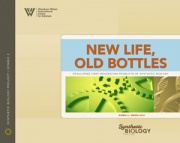Events
March 25, 2009
Popping the Cork on Synthetic Biology
March 25, 2009 12:30 – 1:30 PM
-Light lunch available at 12 PM -5th Floor Conference Room -Woodrow Wilson Center

In New Life, Old Bottles: Regulating First-Generation Products of Synthetic Biology, Rodemeyer examines the benefits and drawbacks of using the existing U.S. regulatory framework for biotechnology to cover the new products and processes enabled by synthetic biology. He finds that the similarities between biotechnology and synthetic biology are abundant enough for the current biotech oversight system to provide a good starting point, but it is not a perfect match.
According to Rodemeyer initial synthetic biology products will be relatively simple modifications on existing technology, but as the technology develops, regulatory agencies such as the Environmental Protection Agency and Food and Drug Administration will face challenges in assessing potential risks and controls. "Laws like the Toxic Substances Control Act (TSCA) and Federal Food, Drug, and Cosmetic Act simply were not designed to handle 21st century advances."

